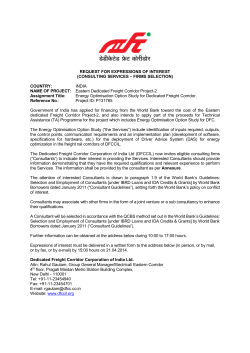
What does the next 20 years hold for transport and logistics?
What does the next 20 years hold for transport and logistics? VISION 2035 “Political, environmental, technological, social and demographic change will impact on the way we travel and transport goods.” Road travel % 33 Rail freight % 84 Sea freight % 180 Population to increase by 14% to 72 million between 2008 and 2033 Extra 10 million people will be resident in the UK In 25 years’ time nearly a ¼ of the population will be over 65 Number of miles travelled by the UK population continues to rise Increasing demand for 24 hour services Government outlined aspiration to double rail travel by 2035 Average number of trips per person falling High probability of change in climate Energy demand will increase by 30-40% by 2030 UK FREIGHT PLANNING TO 2035 “It is clear that as a nation we need to think radically about freight and logistics or find ourselves falling down the World Bank rankings…” 80% by 2050 Reduced carbon emissions UK is in top 10% for its freight and logistics capabilities 30% 7 years £770 Rail freight projected rise 8% million 30% 10% Collective turnover Internet shopping forecasted retail expenditure growth by 2025 Road share of freight reduction workforce Vulnerable to rises in fuel costs which are projected to continue Freight employment in UK THE FUTURE OF AVIATION “CILT holds a positive view about the sustainability of aviation” Technology advances in airspace will reduce greenhouse gas emissions There is sufficient demand to justify one additional runway in the south-east and modest growth throughout the UK Policy for longer term should plan for modest growth under environmental and delivery constraints Aviation is an international activity and impossible to achieve improvements in isolation Aviation growth is a key component of the economy Passengers will be served through new communication developments UK airport strategy is particularly sensitive to political events A VISION FOR TRANSPORT PLANNING “Over the next 20 years, forecasts suggest that there will be a steady trend of economic growth and rising population” Planning and management of our transport networks and services requires a thorough knowledge of local needs, circumstances and priorities Technology and travel will have a significant effect on lifestyle and wellbeing Highly likely that within the next 20 years the need to create an acceptable road charging regime will become apparent to all political persuasions Failure to address the challenges faced will result in increased congestion on our roads, trains, trams and buses, and consequent damage to the economy, environment and quality of life Development of smartphone technology will open a range of opportunities for transport information services The Chartered Institute of Logistics and Transport has attempted to examine the forces of change and develop a vision for 2035. The report series can be read in full at: www.ciltuk.org.uk/PublicPolicy/Vision2035 The transport planning profession must attract high-quality graduates
© Copyright 2025





















